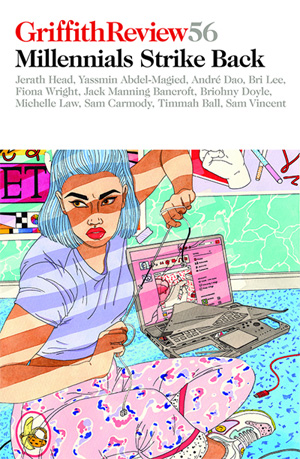Griffith Review essay: ‘Worlds Beyond: Teachable moments in virtual reality’, May 2017
An essay for edition 56 of quarterly print publication Griffith Review, which is titled Millennials Strike Back. Excerpt below.
Teachable moments in virtual reality
The blue whale is only a metre or two away from me, and its huge right eyeball is level with mine. I have never seen the largest creature on Earth from this angle, at this depth, in these dimensions. Its body mass fills my vision, and I have to turn my head 180-degrees to take it all in. I’m standing on the bow of a sunken ship, and I have watched, enthralled, as this dweller of the deep sea approached from the dark-blue distance on my left. The surrounding schools of fish and graceful manta rays take little notice of the giant: for them, its presence deserves the equivalent of a submerged shrug; it’s something they see every day. But for myself, standing here on the ship, rooted in place in wonder, it is an extraordinary encounter.
As it hovers before me, the beast blinks and emits a few curious groans before tiring of this underwater interloper. Just another human being. Boring. When it swims to my right in search something more interesting to look at, its tail-flukes almost lash me on the way past. In sum, I’ve spent only a minute in its company, but I feel as though quite a few things have changed. This is a fork in the road: my life can now be categorised as ‘Before Whale’ and ‘After Whale’. But perhaps the most astounding part of this experience is that it is running entirely on computer code. Even though every aspect of this scene feels real, it is not.
After I watch the whale disappearing into the dark-blue distance, I turn around to see white text projected on the back of the sunken ship. It is a list of credits for the team of people who worked on this convincing simulation. It’s named ‘Whale Encounter’, and it’s part of a virtual-reality game called theBlu. In reality, you see, I’m standing in a tiled living room in New Farm, in inner-city Brisbane, wearing a headset that is attached to a powerful computer by a thick, black cord. The view from the balcony outside is filled by the Story Bridge. Beneath the steel structure runs the Brisbane River, where there are no blue whales, as far as I’m aware.
Next, I use one of the wireless controllers in my hands to point and select ‘Turtle Encounter’. This is just as impressive as the previous immersion – and several minutes longer, too. In startlingly clear water, with the sun shining through the surface above me, I stand at the edge of a coral reef. A loggerhead turtle cuts a lazy circle above me, just out of reach. On my right, I’m approached by hundreds of football-sized bright orange jellyfish. Before long, these small creatures are accompanied by several enormous, man-sized giants whose tentacles trail behind them like windblown dreadlocks. Using the controllers, I can prod the jellyfish to affect their trajectory. It is simply gorgeous, and like the whale, it inspires a sense of awe unlike anything I’ve experienced while playing a traditional video game.
When it comes to eliciting emotions, it appears that virtual reality is streets ahead of everything that’s come before. Moreover, it strikes me that this sort of experience could foster new understanding for children who struggle to process information that’s delivered verbally, or presented on a printed page. Any child can strap on a headset, fire up theBlu and take something away from the experience of feeling as though they are immersed underwater, inside a potentially dangerous and hard-to-reach part of the planet, while still engaging their minds in a way that a textbook, or even the most fervent educator, might fail to achieve.
To read the full essay, visit Griffith Review‘s website and purchase edition 56, Millennials Strike Back. The image on the book’s cover above is credited to illustrator Laura Callaghan.

Hello Andrew,
I thoroughly enjoyed your wring style! You could say that, “I am a work of art in progress”
Thanks,
John Slater